One of two great epic poems by Homer to survive from ancient Greece, The Iliad unfolds across two months in the final year of the Trojan War. The Greeks – led by Agamemnon, and with Achilles as their greatest warrior – are still trying to capture the mighty city of Troy. The Trojans – led by Hector – have resisted for 10 years.
Into this mortal combat come an additional cast of gods and goddesses who take to the battlefield to intervene in the course of the war. And as the gods squabble and men battle, the women of Troy are limited to watching from the city walls, and hoping their loved ones come home.
Every generation finds The Iliad anew: it holds up a mirror to the times in which it is read, as well as the time in which it was created and the one in which it is set. Emily Wilson – the first woman to translate Homer’s Odyssey into English – has just published a new translation of The Iliad. She spoke to the classicist and writer Natalie Haynes, whose latest book Divine Might explores the stories of the Greek goddesses, about how The Iliad is a story of war, of honour and reputation, and of what it means to be a man.
More like this:
– What The Iliad tells us about worship
– The mysterious ancient civilisation that resonates now
– The fantastical beasts of ancient Greece
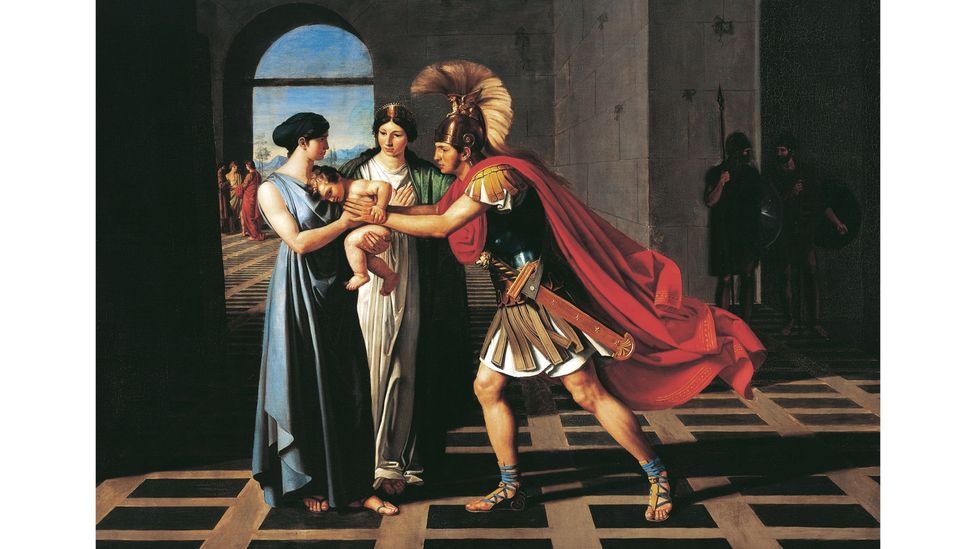
Andromache intercepting Hector, by Fernando Castelli, 1811 (Credit: Getty Images)
How The Iliad is the original action film
Natalie Haynes: Your new book is a propulsive read quite separately from what an excellent translation I think it is. It is going to drag people through it, because it is an action movie, isn’t it, in parts, The Iliad? Things really happen, and they happen at speed.
Emily Wilson: A lot of things happen at speed. I mean, both material things and emotional things, and they’re happening really intensely and very fast all the time. And it’s often very, very noisy and very intense. And you have to feel all of that and want it to keep going, even though it’s horrible.
NH: So many characters die in combat – I wondered if it was painful after a while writing those sections, because a lot of the deaths are incredibly explicit. They’re incredibly violent. There’s no sense of the camera pulling away, it’s really close up. I’ve written before that there’s no winner in hand-to-hand combat, there’s just a survivor. But you really feel it in The Iliad, was it hard?
EW: It was hard. In a way, it felt like a beautiful kind of hard, because I think there’s always so much compassion as well. There’s a horrible kind of excitement. I felt I was sometimes in touch with really nasty parts of myself that were enjoying violence and relishing that, there’s a sort of visceral thrill of contemplating scenes of massacre, and I certainly felt that thrill and then I would think ‘what have I been doing, how am I buying into this?’
And yet at the same time, there’s so much compassion and you’re feeling the pain in a way that you don’t necessarily if it’s a Hollywood action movie, where the characters just exist to get blown up. I do think that’s quite the case with even the characters who exist only as one line, eg ‘then the spear goes through his liver’, but we might get the name of his father, or the name of his homeland.
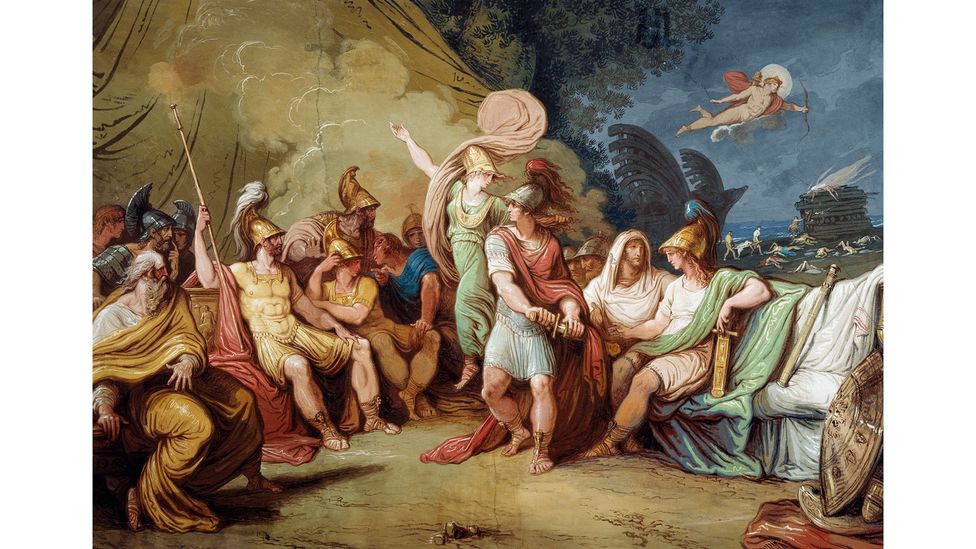
Dispute between Achilles and Agamemnon, fulcrum of the cycle with the Stories of the Iliad, by Felice Giani (1758-1823), fresco (Credit: Getty Images)
The need for men to find immortal fame in a culture without a written language
NH: I wanted to quickly talk about the pursuit of glory and immortal fame. Because they seem so integral to this society, and to us, it’s really hard to find language that doesn’t make it sound essentially trivial. And you have to stop and remind yourself, and remind readers or listeners, that this is a society without records in the same way that we have now. This is your chance – if you become famous enough to be immortalised in song, this is what it means to live beyond your lifespan. There is something much more elemental about the search for fame in The Iliad than there is in in our world, for example.
EW: Yes, I think that’s right. I think that modern readers sometimes do have that tendency to trivialise the centrepiece quest of The Iliad, of that choice of the warriors to risk their lives for fame or the avoidance of shame, both in this lifetime and then afterwards, both having a legacy in the poem itself as a name and also a legacy on the landscape, in having a mound or a memorial. There’s a great passage where Hector talks about hoping to leave his mark on the landscape by having a funeral mound for one of his victims, and then somebody sailing past at some future point will say ‘that funeral mound was for somebody killed by great Hector’.
I think you’re absolutely right that it’s an imaginative leap that we have to make to be in the world of this poem. To understand that this really matters. And that also the poem is presenting it both as successful – I mean, this poem exists telling about these characters – and then also as unsuccessful, because we also know [the gods] Apollo and Poseidon will let all the rivers create environmental disaster and the plain of Troy will wash everything away. So they will win eternal fame through poetry, but not through any of the other means that they hope they’re winning it.
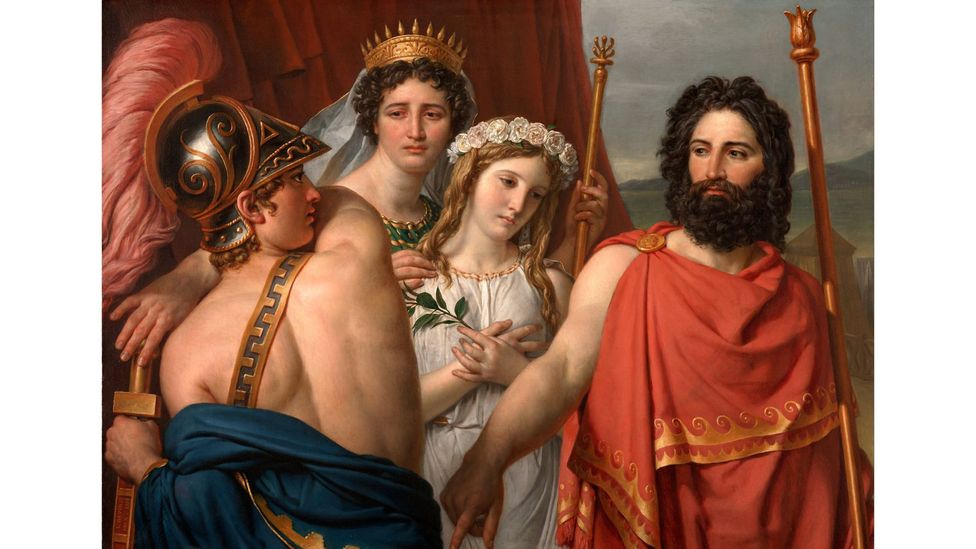
The Anger of Achilles by Jacques-Louis David, 1819 (Credit: Getty Images)
How The Iliad was about humans’ impact on the Earth
NH: The idea of The Iliad as a kind of apocalyptic environmental metaphor is something which I think is a relatively new way of looking at the poem. Even the idea of the Trojan War, at least in some of its versions, is that there are too many people and we’ve grown too heavy, and Gaia is groaning under the weight of us. And they have the Theban conflicts, and that gets rid of some people, but not enough. And so they bring on the Trojan War. Is it an early population anxiety metaphor?
EW: It very much is, yes, and we know from the ancient notes from the start of The Iliad, and from a poem that doesn’t survive entirely, The Cypria, that an early myth, the ‘plan of Zeus’ (referred to in the beginning of the Iliad), entailed the decimation of the human population because they’re a burden on the Earth.
I don’t think that’s the only way to read The Iliad now, but I do think that in earlier eras of reading The Iliad, people very often wanted to connect it to a specific war that was happening then. For instance, ‘is The Iliad like the English Civil War, or is The Iliad like Vietnam or is The Iliad like World War Two?’ I think when reading The Iliad in 2023, one could connect it to any one of the many conflicts and kinds of human violence that are happening around the globe, but I think it also really resonates with the idea that most of us are living in places that can’t be inhabited by humans for that much longer.
And so in that sense, we’re echoing the position of those living in both the Greek encampment and the Trojan city, there won’t be humans there for much longer after this poem ends.

Emily Wilson (Credit: Elijah Ellis)
How Achilles ends up battling the landscape itself
NH: Sometimes, the natural world even rises up to protest, like the moment where Achilles chokes the rivers with bodies. Perhaps there’s a better metaphor for both the terrible futility of human life, the terrible futility of war, and also the terrible damage wrought upon the landscape, but it’s hard to think of what it might be.
EW: Absolutely – and it’s incredible, because we haven’t seen a human fighting with the landscape before, in the way that Achilles does by choking the river with bodies, the Scamander [river] rising up and telling him to stop doing it, and yet he still wants to push on.
Then we end up with fire and water fighting, with the river rising up against the fire god. And it certainly resonates with the wildfire crises and flooding all around the world. There’s this sense that humans have gone too far and clogged up the world, and fire and water are rising up against us and trying to tell us to stop, and yet we still want to go on.
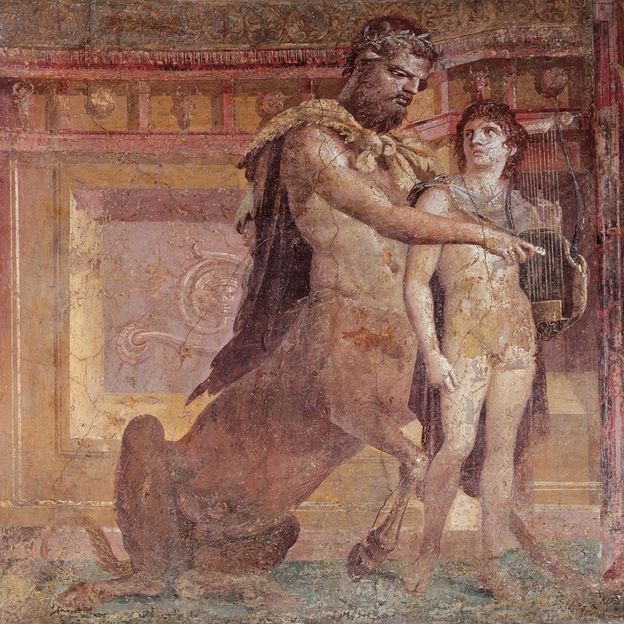
Chiron and Achilles Child, by unknown artist, 1st Century, fresco (Credit: Getty Images)
What The Iliad means today
NH: We do have to keep rediscovering Homer, don’t we? Why is that?
EW: Yeah, we definitely do. I think that a retranslation is an invitation for a rereading at a different cultural moment and with different literary and aesthetic and cultural sensibilities. The questions that Homeric scholars ask of the original poems now are different from what people were getting out of the Homeric poems in the early 20th Century.
I’ve talked about The Odyssey as a poem about colonisation or about The Iliad as a poem partly about climate disaster, or about celebrity culture. All these things that we’re preoccupied by, like, ‘what’s the relationship between humans and technology?’ The Iliad is all about that. And of course, The Iliad has different things to say from what we might say about any of those things, and about ‘why is everyone so angry all the time?’ because that’s the case in our culture, but it’s also the case in The Iliad.
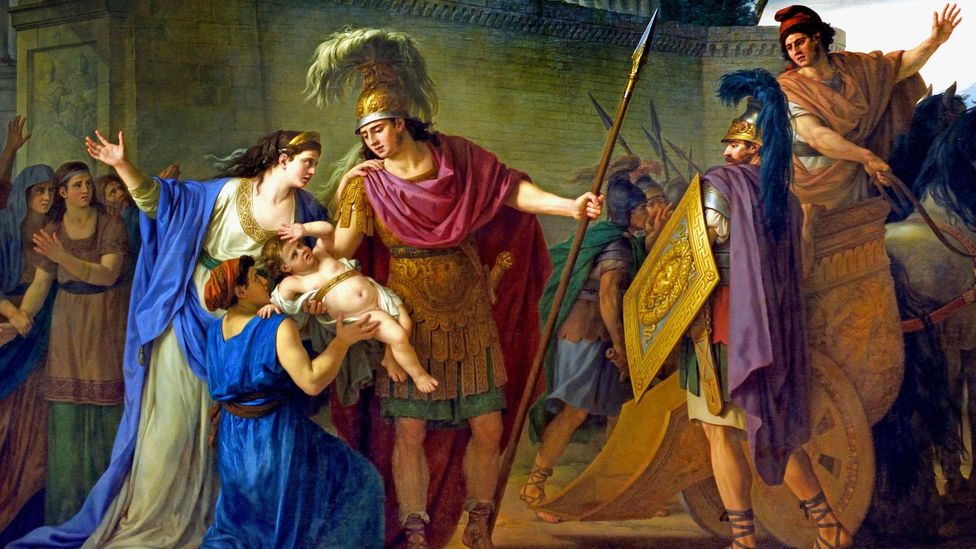
The farewells of Hector and Andromache (Homer, The Iliad, song VI), 1786, by Joseph-Marie Vien (Credit: Alamy)
Why The Iliad is about what it is to be a man
NH: I’ve thought for a long time now and argued that the poem is all about what it means to be a man and different kinds of masculinity, and models of those different kinds of masculinity are available throughout the poem, kind of every moment in a man’s life – it’s like the seven ages of man doesn’t come close. The rage of Achilles; the toxicity of Agamemnon; the caring, the healing of Patroclus; the devotion of Hector; the wit and cleverness of Odysseus; the ageing, fearful patriarch of Priam. Do you think that’s part of why the poem still resonates so strongly – it does have a huge amount to tell us actually about masculinity?
EW: I think it has a lot to tell us about masculinity, and as you say about the varieties of masculinity and the varieties of ways that masculinity can be tied up with all these kinds of vulnerability. I mean, the desire to be ‘the best man’ when there were so many ways to be a man, and there were so many different social compulsions on men.
There’s a famous line about teaching Achilles to be ‘both an artful speaker and a skilful warrior’, and to be a man in this poem, you have to be the best at least two completely different kinds of characteristics, and then you also have to be the best like Agamemnon at gathering the most forces, gathering the most wealth, and you have to be the best at droning on in the council meetings like Nestor – there are so many different categories of it.
And yet there’s also so much awareness that being a man is tied up with a kind of pride and sense of self that can isolate you, and being the best means being out ahead of all the others. And this question, which is at the heart of the poem, about can there be a community of men? If masculinity is all about being better than every other man, then how can men be together without killing each other? The poem’s exploring that possibility of whether men could ever be in a community that didn’t involve slicing each other’s eyeballs out.
And we get some little glimpse of what that might look like in the funeral games, where the men are still skilful in totally different areas. One man is good at chariot racing and another man is good at the foot race, but there are enough prizes to go around so they don’t end up killing each other when they don’t win.
So much of the poem is focused on that – in the Greek, the terms which I really struggled with are cognate with the word ‘man’ but suggest an excess of masculinity, and the poem is exploring, ‘can you be too much of a man?’ Is that what kills Hector, that he’s so much of a man that he’s always going out ahead of others, and is that what drives the rage of Achilles, being so much of a man that he’s got an almost more-than-human desire to cause damage and to replicate his honour to an infinite degree?
It’s also so smart, this poem, about the intertwining of mockery and fear of shame with honour culture. They’re always intertwined. The battlefield is a place where you win honour, but it’s also a place where people hurl insults at each other – I mean, even gentle Patroclus who we like to think of as the kind one, he’s so vicious on the battlefield, and also so great at coming up with the best trash-talking. What it is to be the best in the battlefield is not just throwing the spears, but also coming up with the most biting insults – ‘you might be good at gymnastics, but I’ve just speared you’.